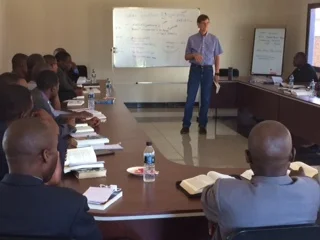It is now Sunday evening, and for a moment, darkness has prevailed: Giurgiu, an hour’s drive south of Bucharest, is experiencing an ice-storm, and so a short-lived, electrical blackout. However, when we arrived Thursday noon, the skies were a deeply inviting blue with puffy-white, bellowed clouds — and short sleeves abounded. How refreshing to step into spring, but not so tonight: a cold, dreary, spring rain has now coated tree buds with ice.
On Friday just past, my goal was to make any necessary preparations for the pastoral/ church leaders’ retreat planned for that day, 16:00 – 20:00 hours, and for Saturday, 10:00 – 15:00 hours. Those preparations moved apace with no glitches; however, I apparently lathered too much honey upon the bread I ate for breakfast. Soon thereafter my right cheek and then my lips began to swell, giving me a very distorted, jowl-look. I was in no pain, but looked decidedly odd. Thankfully one in our number — usually I carry Benadryl — gave me a tablet; by Saturday morning my allergic reaction and its swelling had mostly disappeared.
In spite of my physical features, and of far greater significance, the retreat went very well. Approximately 40 people (i.e. pastors, seminary students, and church leaders) attended, and they like their counterparts in Malawi and Bangladesh, delighted in a pattern of personal study, small- followed by large-group interaction. As is the normal Johnsonian pattern, in the approximate 8 hours of study-interacting-teaching, we considered 46 verses or nearly 6 verses/hour. From my perspective these moments provided rich fruit, as we pondered Jesus foretelling His death and His disciples’ responses to those warnings, even as we sought to characterize Him as a leader and His disciples as those led (Mark 8:22-35; 9:30-41).
Today I had the privilege of preaching at the Bethel Church (i.e. a Brethern-related body of approximately 70 in attendance), followed in the afternoon by my preaching at an outreach event, seeking to share the Person and Work of Christ to non-believers: Romania, like much of Europe witnesses 1% of the population in worship on Sunday mornings. This figure, in part, reflects the strong tie, which existed between the Orthodox Church and the Communist Party of Romania and the subsequent reaction to that tie upon the revolution of 1989. This makes for a very different setting than that of the US.
As I reflect upon the past 72 hours, I wonder: upon returning to Indiana, although much of my imaginative efforts have centered upon Malawi (and that focus remains), could it be that Romania might become a “Macedonian call” for me? Certainly when we returned to Indiana, Romania was not upon my “radar screen,” but neither was “spiritual direction”; but within the past 9 months I have been providing spiritual direction to 2 Romanian pastors via Skype.
I wonder.
Stan



